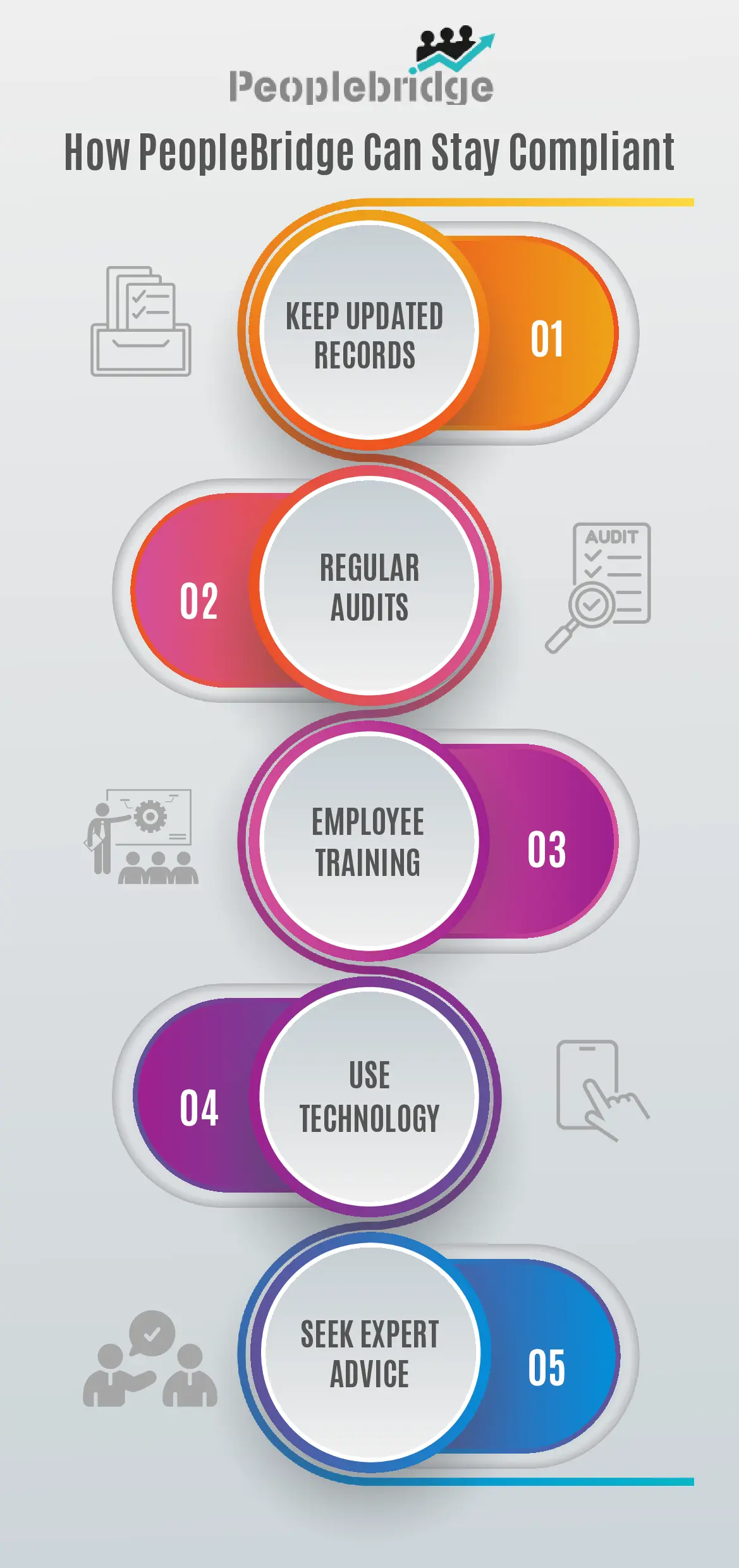Operating a business like PeopleBridge requires compliance with numerous government rules, also known as statutory compliance. Those rules are there to make sure the company treats its workers fairly, pays its taxes properly and has a safe workplace. Ensuring legal compliance is crucial if you want to earn the trust of the market, steer clear of legal issues, and run a successful business. In this post, we’ll tell you what this means, why it’s important within PeopleBridge, and even how the company can make sure it’s compliant with all statutory regulations. This will enable PeopleBridge to defend its reputation, support its employees and continue to grow responsibly.
What Is Statutory Compliance?
Statutory compliance refers to the legal rule a company must follow according to the government for businesses. These regulations span domains like fair wages for employees, proper record keeping, timely tax payments, safe and healthy work environments, and plenty more. The legal regulations for each country differ, and companies need to keep up-to-date to avoid getting into legal hot water with fines and punitive actions against them. Compliance with the acts is not a one-time process; it’s an activity to be performed on a routine basis, as rules can be changed, and you need to comply with rules repeatedly. By remaining compliant, businesses shield themselves from legal liability and earn the trust of employees and authorities.

Why Is Statutory Compliance Important?
- Avoiding Penalties: Violating the guidelines can bring hefty fines or possible legal action. This is reputation damaging and can be very expensive.
- Protecting Employees: Compliance is in place to make sure that employees are paid properly, have safe working conditions, and are given benefits. It contributes to a positive work environment.
- Building Trust: When PeopleBridge follows the law, it builds trust with employees, customers, and investors. This trust helps the company grow.
- Smooth Operations: Following the rules keeps the business running smoothly and avoids sudden disruptions from government inspections or lawsuits.
Key Areas of Statutory Compliance
1. Labour Laws and Employee Welfare
PeopleBridge must follow laws that protect workers. These include:
- Minimum Wages Act: Pay employees at least the minimum wage set by the government.
- Payment of Wages Act: Pay salaries on time, without unfair deductions.
- Provident Fund (PF): Deduct and deposit PF for employees to help them save for the future.
- Employee State Insurance (ESI): Provide health insurance for employees.
- Gratuity Act: Pay gratuity to employees who have worked for a certain number of years.
2. Tax Compliance
- Income Tax: Deduct tax from employee salaries (TDS) and deposit it with the government.
- Professional Tax: Deduct and pay professional tax where required.
- Goods and Services Tax (GST): Collect and pay GST if the company sells goods or services.
3. Company Law Compliance
- Board Meetings: Hold at least four board meetings every year. The gap between two meetings should not be more than 120 days.
- Annual General Meetings: Hold a meeting every year to discuss company matters and compliance issues.
- Appointing Auditors: Appoint a qualified auditor within 30 days of starting the company.
- Filing Returns: File annual returns and financial statements with the Registrar of Companies.
- Maintaining Registers: Keep records of shareholders, directors, and meetings.
4. Workplace Safety
- Shops and Establishments Act: Follow rules about working hours, holidays, and safety.
- Factories Act (if applicable): Ensure safety measures, cleanliness, and proper working conditions.
How PeopleBridge Can Stay Compliant
- Keep Updated Records
Maintain all records related to employees, salaries, taxes, and meetings. This helps in case of inspections and audits.
- Regular Audits
Conduct yearly audits of financial records and compliance processes. Audits help find mistakes early and fix them.
- Employee Training
Train employees about company policies, workplace safety, and their rights. Training helps everyone understand the rules and follow them.
- Use Technology
Use software to track payroll, taxes, and compliance deadlines. Automated reminders can help avoid missed filings or payments.
- Seek Expert Advice
Consult with legal and tax experts to stay updated on changing laws. Experts can help interpret complex rules and suggest best practices.
Common Challenges in Statutory Compliance
- Changing Laws: Rules can change often. PeopleBridge must keep track of updates and adjust policies quickly.
- Multiple Locations: If PeopleBridge operates in different states, it must follow local rules in each place.
- Resource Constraints: Smaller teams may find it hard to manage all compliance tasks. Using software and outside consultants can help.



Benefits of Good Compliance
- No Legal Trouble: Avoid fines, lawsuits, and shutdowns by following the law.
- Happy Employees: Fair pay and benefits keep employees motivated and loyal.
- Business Growth: A compliant company attracts more customers and investors, helping it grow.
- Better Reputation: Good compliance builds a positive image in the market.
Statutory Compliance Checklist for PeopleBridge
Here’s a simple checklist PeopleBridge can use to stay compliant:
- Pay minimum wages and overtime as per law.
- Deduct and deposit PF and ESI for all eligible employees.
- File TDS and professional tax returns on time.
- Hold regular board and general meetings
- Maintain all statutory registers and records.
- Conduct annual audits and circulate financial reports.
- Train employees on policies and safety
- Update policies as laws change
Conclusion
Compliance with our laws is not simply a matter of checking boxes or going through the motions of a process; it’s about the honesty that lies at the foundation of a well-functioning society. Compliance for PeopleBridge is about more than just protecting employees and avoiding legal trouble; it’s a necessity for growth and creating a foundation. By staying aware of the laws, training their employees and using the right tools, PeopleBridge can guarantee ease of operation and a healthy outlook.
Complying with statutory law can be complicated, but with a few simple steps, you can keep your statutory obligations in check. Having a strategy in place and checking in regularly will ensure PeopleBridge is compliant with all its legal obligations and can focus on what’s important: growing the business and supporting its people.
Frequently Asked Questions(FAQs)
It refers to adhering to laws and regulations related to employee rights and workplace standards.
It helps businesses avoid legal penalties and ensures a fair, safe work environment for employees.
PeopleBridge offers expert guidance, updates, and tools to keep your business legally compliant.
It includes labour laws, minimum wages, PF, ESI, gratuity, and other employee-related regulations.
Yes, PeopleBridge offers solutions tailored to your business size, sector, and specific requirements.
